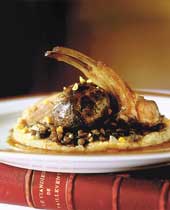 |
| Picture perfect: A meal based on a medieval recipe by Guillaume Tirel, who lived in 14th century France. (AFP) |
London, April 8 (Reuters): Just months ago, Americans were hurling insults such as “cheese-eating surrender monkeys” across the Atlantic at the French amid recriminations over Iraq.
Now a Frenchman — in fact Raymond Blanc, one of the world’s most famous chefs — is holding out a hand of friendship to his US rivals and inviting America’s top chefs to bestow their multi-cultural culinary wisdom on Europe’s cooks.
“America has a very integrated cuisine — it’s like their culture,” Blanc, who lives and works in Britain, said. “In that way, it is better than what we have — and maybe there are things we can learn from the way it is done.”
To encourage transatlantic learning, Blanc is hosting a conference entitled the “American Food Revolution” — seven days of discussion between US, British and French chefs and representatives of farming, processing and retailing industries.
The conference — at Blanc’s award-winning 15th century restaurant Le Manoir aux Quat’ Saisons in Oxfordshire, southern England — is meant to showcase what he says is the “remarkable impact” the US is having on the global culinary landscape.
Among the cooks on the guest list are Thomas Keller of reputed French Laundry restaurant in Californian wine country, Alice Waters, owner of the famed Chez Panisse also in California, and Charlie Palmer, the man behind Aureole restaurants in New York and Las Vegas.
“These American chefs, who originally learned their craft from their French counterparts, have now evolved a style of cuisine which is a reflection of their multicultural society — it is effectively fusion cuisine,” he said.
“It has Hispanic background, South American, Italian, French, you name it... They have succeeded in integrating all these influences in their cuisine. It celebrates the differences, and there is harmony in it.”
“But in England we have not succeeding in doing this. Here we have great Italian, Thai and Indian restaurants, but very rarely do you see restaurants where the influences of the multicultural society we live in have been fully integrated.”
Blanc acknowledges it may come as a bit of a shock for people in Britain, and more especially France, to hear America — the land of McDonald’s and Dunkin’ Donuts — being applauded for its excellence in food.
“Of course, America is better known as a nation of food haters,” he says. “It still grows 99 per cent of its agriculture through genetic modification or intensive farming.”
“But these American chefs have created a nucleus of gastronomy, one which has diversity and harmony. More importantly, they have created a nucleus of agriculture which is sustainable. They grow their own food with local farmers and producers.”
For Blanc this is the key to the future.
“Gastronomy has its roots in the soil — it comes from the hundreds and thousands of small farmers and producers,” he says.
He wants his Food Revolution festival, which starts on April 15, to examine ways of reconnecting cooks with the food they prepare, and consumers with the food they buy and eat.
He hopes the conference will help convince chefs in Britain and France that they can do more to influence the food supply chain — insisting the produce they buy is local, produced to high standards and grown from the best plants and seeds.










